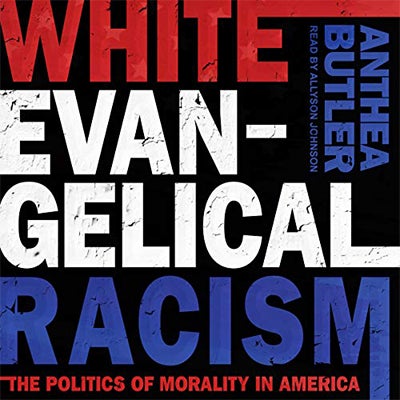Reviewed by Bianca Mabute-Louie, Department of Sociology
White Evangelical Racism: The Politics of Morality in America by Anthea Butler, title here, chronicles American evangelicalism’s support for and participation in racist structures in America throughout history. Written in a concise and compelling way for wide audiences, Butler re-frames evangelicalism not as a religious group, but as a nationalist political movement whose purpose is to support the hegemony of white Christian men. Despite declining numbers, evangelicalism remains a powerful political movement. The “white” in white evangelical racism is part of the construction of evangelicalism from the theological to political. In the 1970s in particular, the widespread support of white evangelicals for the Republican Party made them not just religiously or culturally white: it made them politically white conservatives in America concerned with keeping the status quo of patriarchy, cultural hegemony, and nationalism.” (Butler, 4).
Through chapters organized chronologically around different periods of U.S. history, Butler exposes racism as a key feature and foundation, not a bug, of American evangelicalism. In the 19th century, the concept of morality through interpretation of scriptures, theology, and belief informed evangelicals’ social and political actions, and justified the oppression of African Americans during and post-enslavement. In this era, responses to slavery, the Lost Cause, Jim Crow, and lynching shaped the evangelical movement and elucidated the biblical and theological foundations connecting the white evangelical subculture with racism and right-wing politics. In post-World War II America, Billy Graham and televangelists played a significant role in defending the racist status quo and gaining political clout. They missed opportunities to challenge Jim Crow racism, instead focusing on fighting communism and saving souls. Later, from the 1960s-90s, white evangelicals had to confront racism acutely as they were criticized by Black evangelicals and Black Americans. Evangelical overtures toward racial reconciliation were numerous, but the results were short-lived and cosmetic. During this time, they continued to consolidate power by aligning with the Republican Party on issues like “defending the American family.” Finally, in the 2000s, the Right capitalized on white evangelical fear of social degradation with the perceived threat of white Christian discrimination at the hands of Muslims, immigrants, leftists, outsiders, and a Black president. Through these examples, Butler argues that evangelicalism in the U.S. is an Americanized Christianity born in the context of white Christian slaveholders, and upheld to support the hegemony of white supremacy and the racial status quo. Butler closes the book with a call to action for white evangelicals to reckon with the historical racism of white evangelicalism.

